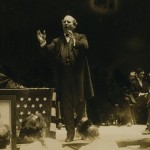Is Amazon’s decision to open brick-and-mortar bookstores an indication that the business is turning around. Gracy Olmstead wonders:
We are sensory creatures. Our participation in the world is not just prompted by information and digital connection, but also by things such as feel, taste, touch. You can buy a copy of The Brothers Karamazov on your Kindle—or you can stroll over to the nearest bookstore on a rainy day. You can wander through the shelves, pick up a hardback copy, and flip through the pages. You can buy a latte from the café, settle into a shadowy corner, and begin reading with the quiet buzz of other readers around you. For some, the former option will always sound more palatable, because of the ease of the sale. But for others of us—the dogged bibliophiles who love reading for its aesthetic, as well as for its information—we’ll always go back to the bookstore.
But many of my book-loving friends feel almost offended at Amazon’s latest move. After the online retailer “killed” off several of their favorite bookstores, will they now replace them, opening up locations in old Borders buildings? (Probably not literally, but the image is a powerful one.) As Gizmodo put it, Amazon’s move “particularly amusing given how [they] spent the past two decades driving booksellers like B. Dalton, Borders, and Waldenbooks out of business by undercutting their prices. … We can’t wait to see Netflix open up laserdisc rental shops next.”
But H. L. Mencken observed the perilous nature of the book business (and he wasn’t even worried about Kindle or wifi):
It is the sheer multiplicity of new books that is mainly to blame. So many come out every month that a book seller who pretends to carry a comprehensive stock must by far more than he can sell. He has no means of determining in advance which of the newcomers will be successes and which will be flops. So in order to have all of the former in hand when the demand comes he buys great stacks of the latter — and presently he finds his shelves overloaded and his takings insufficient to meet his incoming bills. Hence the dreadfully long credits that he demands. And hence his endless struggle for the larger and larger discounts.
Most American publishers of any standing have made money during the last few years, but not many, I suspect, have made as much as they ought to have made on their turnover. As fast as their returns come in they are invested in more books — which means that they are put into cold storage and remain unproductive for from six months to two years. Thus publishing begins to require more working capital than any other comparable business, and one really bad season would be sufficient to put more than one very prosperous house into difficulties. (“The Book Trade,” December 1927)
The solution? Mencken said publishers should only produce book that have “a sound reason for being and are reasonably certain to have profitable sales.”
There go my titles.















